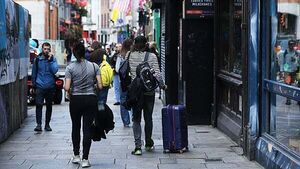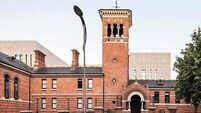Tourism sector warns of US risks, price pressures and staff shortages

Ken Foxe
Fáilte Ireland has warned of growing concerns around Ireland’s dependence on US visitors, as “unorthodox policy decisions” in the United States fuel international uncertainty.
Its April 2024 industry outlook report, designed to offer a 360-degree view of the sector, predicts 2025 to be a “solid year” for Irish tourism, with room for further growth in 2026 and beyond.
However, the report flagged growing price sensitivity among tourists, tight profit margins for operators, and staffing shortages as major concerns facing the industry.
It said: “Consumers are becoming more value conscious as household saving rates are ticking upwards. We’re seeing this in tourism via the declining length of stay witnessed in Ireland and elsewhere.”
The research highlighted broader economic uncertainty, particularly due to political developments in the US. It said global growth was becoming more sluggish, while the outlook for the Irish economy remained “modest, but positive”.
Feedback from accommodation providers and visitor attractions pointed to value-for-money concerns among tourists, especially those from overseas. Many operators are operating on tight margins and are wary of passing on rising costs to customers.
“Price resistance remains a challenge, with margins under pressure as cost increases can’t be fully passed on to the end user,” the report said. “Any price increases are likely to be in line with inflation.”
Some hotels were said to be adjusting their rates downward after losing business due to high prices.
Rising costs were cited by hoteliers as a growing issue.
Operators also raised the issue of staffing shortages, particularly around retention and the increasing reliance on casual or part-time workers.
Investment in facilities and sustainability projects such as solar panels or space modernisation was being delayed by “slow returns on investment and financial constraints”, the report noted.
“Businesses face financial challenges, including high operational costs, VAT, and electricity expenses. Weather dependency and the impact of external factors on visitor numbers are also concerns,” it said.
The report described a “mixed” picture for accommodation providers, with some enjoying strong bookings while others struggled with “low occupancy”.
Nonetheless, there was strong capital investment last year, with an estimated €950 million worth of hotel and hostel transactions in 2023, a 170 per cent increase on the previous year. About 7,200 hotel, aparthotel and hostel bed spaces were under construction at the end of the year.
The research said Dublin commanded a significantly higher “price per key” with a room valued at €360,000 at one upmarket hotel in the capital compared to €134,000 for a similar hotel in Co Cavan.
The DAA, which runs Dublin Airport, expected seat capacity to rise by 5 per cent this summer. Aer Lingus reported steady short-haul bookings and 10 per cent growth in long-haul traffic.
Fáilte Ireland said it had no further comment to add to the report.





